
Simple dining under an olive tree epitomizes Mediterranean living
Welcome to the fascinating universe of Mediterranean cuisine—a vibrant blend of time-tested traditions and flavors that stretch from Southern Europe’s sunny coasts to the energetic landscapes of North Africa and the Eastern Mediterranean. This exploration of Mediterranean cooking goes beyond introducing you to a new diet; it invites you to adopt a holistic lifestyle focused on well-being and longevity. Each flavorful dish serves as your ticket on a culinary journey through the diverse cultures of the Mediterranean.
This in-depth guide will be your reliable ally as you set up your Mediterranean kitchen. It offers valuable insights on essential pantry items, fundamental cooking skills, and indispensable kitchen gadgets. Whether you’re a culinary novice or an experienced chef looking to delve into Mediterranean fare, this guide has something for everyone.
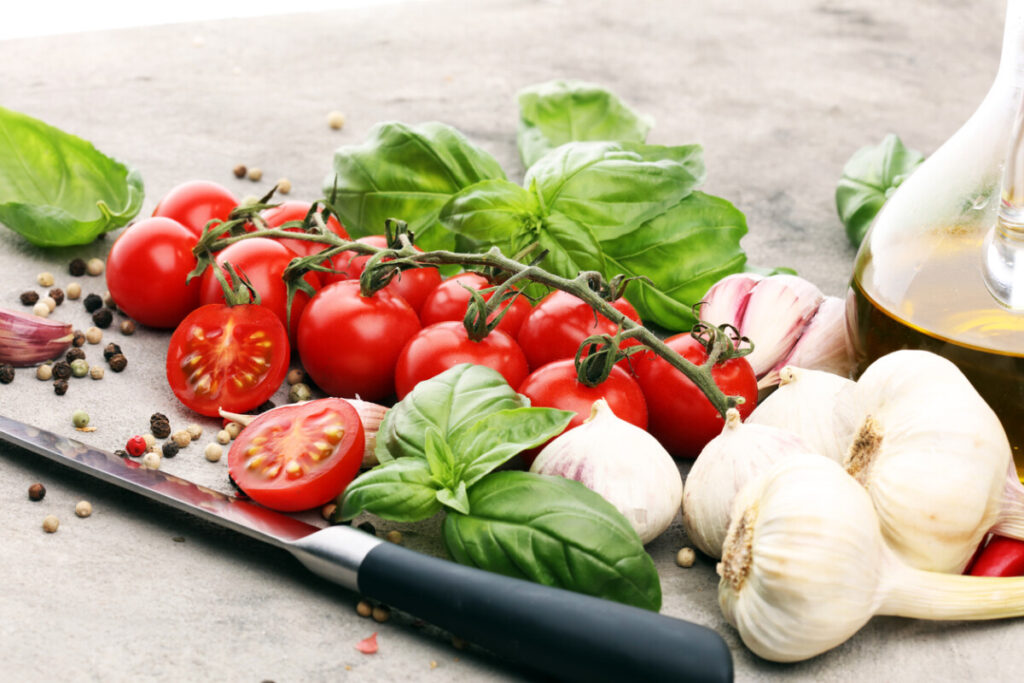 The simplicity of fresh ingredients like tomatoes, basil, and garlic speaks to the essence of Mediterranean cuisine.
The simplicity of fresh ingredients like tomatoes, basil, and garlic speaks to the essence of Mediterranean cuisine.
What is Mediterranean Cuisine?
Before we begin, I wanted to clarify this important question. Mediterranean cuisine is a vibrant culinary tradition that reflects the rich flavors and diverse ingredients found in the countries surrounding the Mediterranean Sea. This cuisine is rooted in Mediterranean culture and emphasizes fresh produce, whole grains, lean proteins, and healthy fats.Incorporating Mediterranean kitchen ideas into your home means stocking up on essential ingredients like olive oil, tomatoes, garlic, herbs, and a Mediterranean spice blend. By embracing the Mediterranean diet essentials, you can create delicious and nutritious meals that celebrate this time-honored culinary tradition’s flavors and health benefits. Moreover, Mediterranean food is a delightful motivation to eat healthy, providing nourishing options that promote overall well-being.
A Dive into the Staples of the Mediterranean Cuisine
Mediterranean cuisine is a beautiful symphony of nutritious ingredients ranging from whole grains and legumes to fresh produce, olive oil, and seafood. The diet emphasizes consuming whole, unrefined grains such as wheat, barley, oats, and rice, which are abundant in fiber, vitamins, and minerals. Moreover, they are the primary source of most Mediterranean food health benefits, which include supporting heart health, aiding in weight management, and promoting overall well-being.
What is in Mediterranean Seasoning?You might be wondering, “What are Mediterranean spices?” A Mediterranean spice mix generally encompasses oregano, thyme, and rosemary, all adding a distinct and delightful herbal taste to this region. With that said, these ingredients are the core staples of Mediterranean cuisine.
Legumes, like chickpeas, lentils, and beans, are central to the Mediterranean diet, providing a rich source of protein, fiber, and essential nutrients. These humble ingredients form the backbone of many Mediterranean dishes, from the Middle East’s falafels and hummus to the comforting lentil soups and bean stews of Greece and Italy.
Mediterranean produce, including tomatoes, bell peppers, cucumbers, eggplants, and a plethora of leafy greens, adds vibrant colors, diverse textures, and a cornucopia of nutrients to the Mediterranean table. Fruits like lemons, oranges, grapes, and figs are cherished for their sweet, tangy flavors and rich vitamin and fiber content.
Olive oil is the golden elixir of the Mediterranean diet, renowned for its monounsaturated fats and antioxidants that contribute to heart health. It’s an everyday staple, used in everything from cooking to salad dressings to bread dips.
Mediterranean seafood, particularly omega-3-rich fishes like sardines, mackerel, and salmon, is prominent in Mediterranean cuisine. Alongside shellfish like mussels, clams, and shrimp, seafood serves as a lean source of protein and is rich in essential minerals.
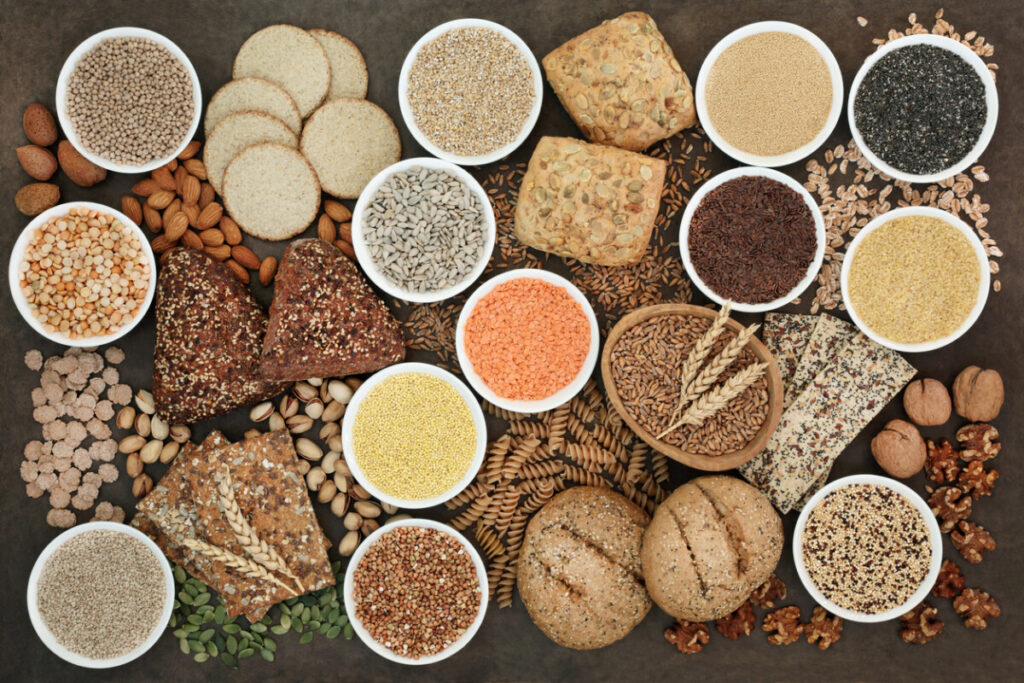
Whole grains and legumes: cornerstone ingredients for balanced Mediterranean meals.
Stocking Your Pantry: Essential Ingredients for a Mediterranean Kitchen
A well-stocked pantry is the key to a successful modern Mediterranean kitchen. Here are some staples that you should consider having on hand:
Oils and Vinegar:
- Olive Oil: The foundation of Mediterranean cooking. Look for extra-virgin olive oil for its superior flavor and health benefits.
- Other Oils: While olive oil is your primary oil, you may also want some avocado oil for high-heat cooking and possibly sesame oil for certain dishes.
- Vinegar: Balsamic vinegar and red wine vinegar are the most commonly used. They’re excellent for salad dressings and adding a burst of acidity to dishes.
Grains and Pasta:
- Whole Grains: Wheat, barley, oats, and rice are commonly used in the Mediterranean diet.
- Pasta: Opt for whole grain options when available. Regular pasta is fine, too – everything in moderation!
- Couscous: A type of pasta that’s a staple in North African Mediterranean cooking.
- Orzo: A rice-shaped pasta often used in salads, soups, or as a side dish.
Legumes:
- Lentils: Used in soups, salads, and more. Both dried and canned varieties are helpful to have.
- Chickpeas: Used for making hummus and other dishes. Like lentils, both dried and canned are handy.
- Beans: Various types of beans, like kidney beans and cannellini beans, are used throughout the Mediterranean.
Mediterranean Herbs and Spices:
- Dried Herbs: Basil, oregano, rosemary, thyme, zaatar and dill are widely used in Mediterranean cooking.
- Spices: Essential spices include cumin, coriander, cinnamon, saffron, paprika, and turmeric.
- Pepper Flakes: For adding a kick to your dishes.
Seeds and Nuts:
- Tahini: This sesame seed paste is crucial for making hummus and other Middle Eastern dishes.
- Nuts: Almonds, walnuts, and pine nuts are commonly used for their healthy fats.
Preserved Foods:
- Olives: Both green and black olives are a staple. They can be used in various dishes or served as a snack.
- Capers: These are often used in pasta dishes and salads.
- Sun-Dried Tomatoes: They can add a rich, concentrated tomato flavor to pasta dishes, salads, and more.
Sweeteners and Other Flavors:
- Honey: The primary sweetener in Mediterranean cooking.
- Pomegranate Molasses: A sweet and tangy syrup in several Middle Eastern dishes.
- Lemon Juice: Fresh is best, but having a bottle of ready-to-use lemon juice is always handy.
Other Pantry Items:
- Bread: Flatbreads, like pita, are a must-have for many Mediterranean meals. Canned Tomatoes are a lifesaver for making quick pasta sauces or stews.
- Stock or Broth: Useful for cooking grains, making soups, and more.
These are just a starting point, of course. Depending on the specific Mediterranean cuisines you’re most interested in, there might be additional items you’ll want to keep on hand. Remember, the goal is to create a pantry that works for you and suits your culinary preferences.
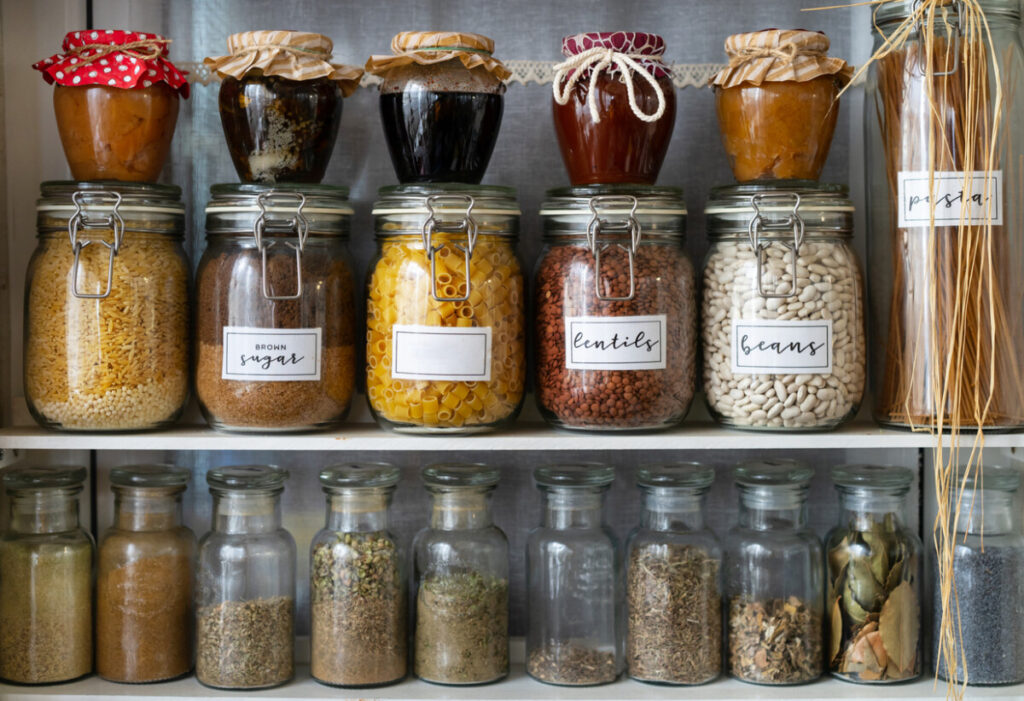
A well-stocked pantry: Where Mediterranean culinary magic begins.
Setting Up Your Mediterranean Kitchen:
Before you start cooking, it’s crucial to have the right tools. A well-equipped kitchen can significantly enhance your Mediterranean cooking experience. Here are some essential items you might want to include in your kitchen:
- Quality Knives: A good chef’s knife can make all the difference when it comes to preparing fresh ingredients. Also, consider a paring knife for smaller tasks and a serrated knife for bread and tomatoes.
- Cutting Boards: Opt for a large wooden cutting board for most tasks and a smaller plastic one for raw proteins to avoid cross-contamination.
- Cookware: Invest in a quality set of pots and pans. This should include a large pot for boiling grains and legumes, a medium saucepan for sauces and soups, and a couple of non-stick pans for everything from sautéing vegetables to cooking fish.
- Baking Sheets and Roasting Pans: Essential for roasting vegetables, baking fish, or making Mediterranean-style baked dishes like moussaka.
- Mixing Bowls: A set of mixing bowls of various sizes is invaluable for preparing salads, marinades, and dips.
- Utensils: Basic utensils include spatulas, spoons, and tongs. Consider also a zester for citrus fruits and a garlic press, as garlic is an essential flavor in many Mediterranean dishes.
- Storage Containers: Various sizes will help you store leftover grains, legumes, and prepared foods. Glass containers are a sustainable choice and can go from fridge to microwave quickly.
- Slow Cooker or Pressure Cooker: Many Mediterranean dishes like stews or legume dishes can be made in a slow cooker or pressure cooker. It’s a time saver and can help to intensify flavors.
- Herb and Spice Storage: Mediterranean cooking uses a variety of herbs and spices. Keep them fresh and accessible with a spice rack or dedicated cabinet space.
- Grater: A box grater is versatile – it can be used for grating cheese, zesting citrus, or shredding vegetables.
Additional Must-Have Kitchen Gadgets
For those who take their Mediterranean cooking seriously, or for anyone who just enjoys the convenience of modern kitchen gadgets, here are a few additional tools you might find invaluable:
- KitchenAid Mixer: A KitchenAid stand mixer isn’t just for bakers. It can significantly simplify the process of making large batches of dough for pita bread, pizza, or even pasta.
- Hand Mixer: For whipping up quick desserts or even making whipped feta or yogurt sauces, a hand mixer can be more convenient than dragging out your stand mixer.
- Food Processor: A large-capacity food processor like a 14-cup model can be your best friend for chopping large quantities of herbs, preparing hummus, or making homemade tahini sauce.
- Blender: While a hand blender is excellent for smaller tasks, a robust stand blender can be essential for making everything from smoothies to more complex sauces and soups.
- Hand Blender: Also known as an immersion blender, this tool can be a godsend for making creamy soups or blending sauces directly in the pot. It’s easier to clean and handle compared to a regular blender for quick tasks.
Remember, the best kitchen setup is one that suits your individual needs and cooking habits. You don’t need to have everything immediately. Start with the basics and add on as you find your rhythm in the kitchen.
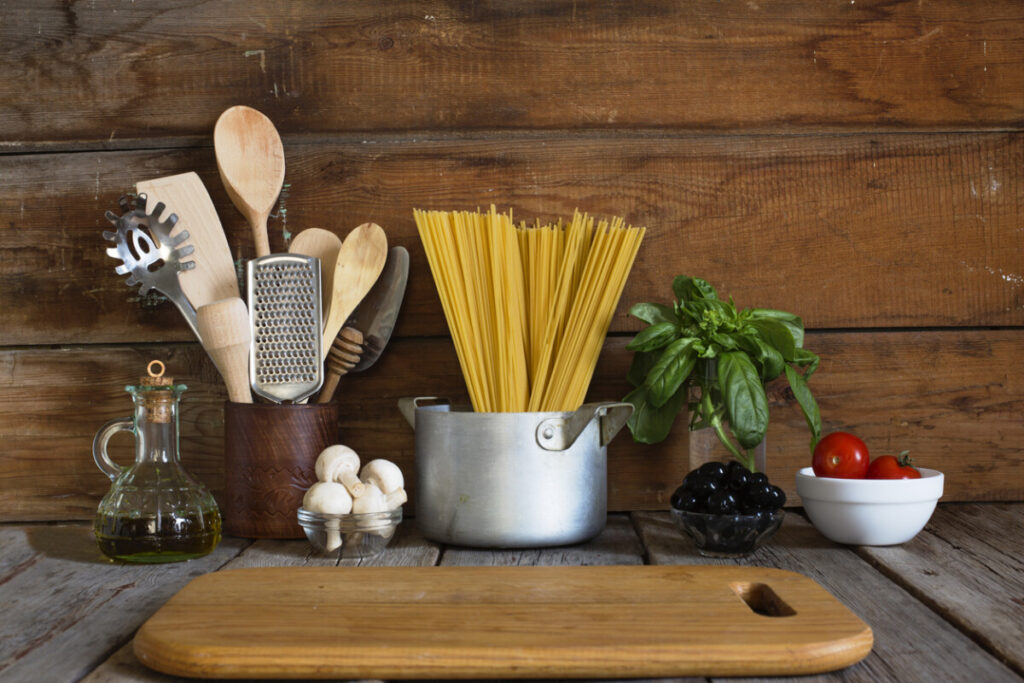
The journey to mastering Mediterranean cuisine starts with the essentials.
Tips for a Stress-Free Mediterranean Cooking Journey
- Choose Quality Ingredients: Opt for fresh, whole foods and source the best quality ingredients you can afford. Farmers’ markets are a great place to find fresh produce.
- Embrace Seasonality: Eating seasonally ensures freshness, optimal flavor, and cost-effectiveness.
- Master Fundamental Techniques: Basic cooking techniques like grilling, sautéing, and roasting are essential to various dishes.
- Plan and Prep in Advance: Cook grains and legumes in batches to save time and ease meal preparation throughout the week.
- Experiment with Herbs and Spices: These flavor boosters add depth to your dishes without extra calories.
- Mind Your Portions: Even with the Mediterranean diet’s health benefits, controlling portion sizes is crucial.
- Savor Your Meals: Mediterranean culture values the enjoyment of food. Take your time and savor each bite.
- Try New Things: With its incredible diversity, the Mediterranean diet offers endless opportunities for experimentation.
- Maintain a Balanced Lifestyle: Remember, the Mediterranean diet goes beyond food. Regular physical activity and social engagement are equally important.
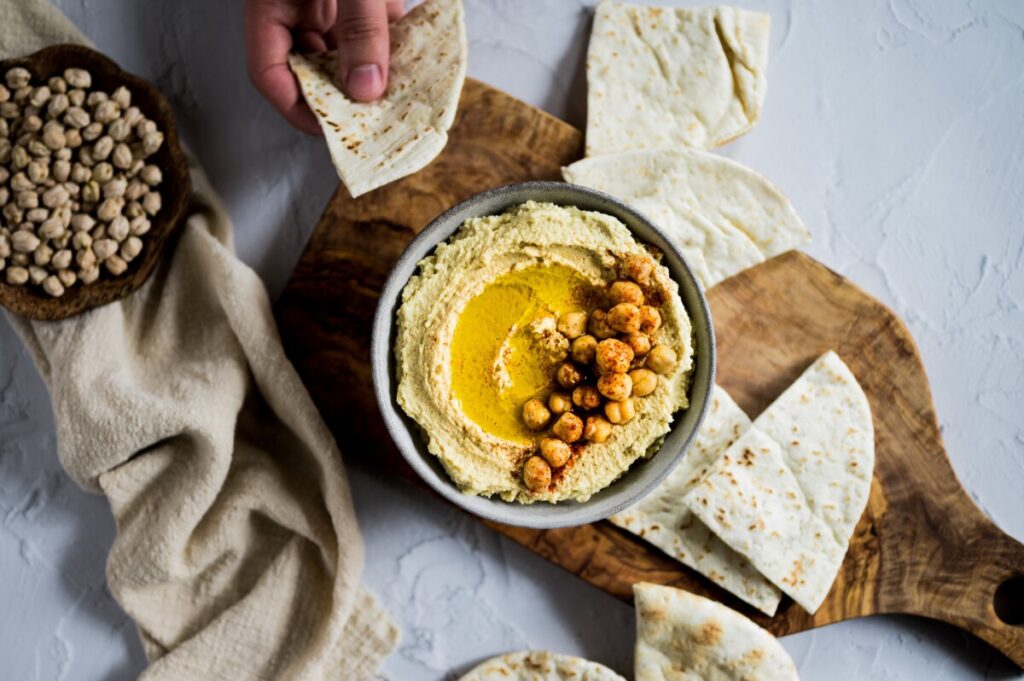
From hummus to pita, the snacks tell the story.
A Selection of Authentic Mediterranean Recipes
Now that you’re familiar with the Mediterranean diet’s principles and have your kitchen ready, it’s time to put this knowledge into practice. Here’s a list of traditional Mediterranean recipes that you can start with. Each of these recipes embraces the spirit of the Mediterranean diet, focusing on fresh ingredients and vibrant flavors.
- Hummus: A creamy and delicious chickpea dip from the Middle East, perfect for snacking or as a side dish.
- Tabouleh: This refreshing Lebanese salad is packed with fresh parsley, mint, tomatoes, and cracked wheat, dressed in lemon juice and olive oil.
- Paella: A famous Spanish dish combining rice, saffron, vegetables, and various seafood or meat.
- Moussaka: This Greek layered casserole consists of eggplant, potatoes, and a savory meat sauce, all topped with a creamy béchamel sauce.
- Feta Dip: A tangy and creamy Greek dip that pairs wonderfully with pita bread or fresh vegetables.
- Musakhan: This traditional Palestinian dish features roasted chicken, caramelized onions, and sumac, all served over taboon bread.
- Mediterranean Quiche: A versatile dish filled with your favorite Mediterranean ingredients like spinach, tomatoes, olives, and feta cheese.
- Shrimp Harissa: A spicy and flavorful North African seafood dish featuring shrimp cooked in a fiery harissa sauce.
Don’t hesitate to experiment with these recipes, swapping ingredients based on your preference and seasonality. there is direct links to each recipe for your convenience! Cooking, after all, is about creativity and personal expression.

Savor the zest of harissa-infused shrimp—an easy recipe to elevate your cooking
Dive Deeper into Mediterranean Cuisine
This guide has provided you with a foundation for your Mediterranean cooking journey. However, the beauty of this cuisine lies in its vast diversity and endless possibilities. On our blog, we have a treasure trove of over 200 recipes, a significant portion of which are inspired by the vibrant flavors of the Mediterranean.
Whether you’re a fan of hearty Greek stews, aromatic Moroccan tagines, refreshing Turkish salads, or savory Italian pasta, we have something to delight every palate. We invite you to dive deeper into Mediterranean cuisine by exploring these recipes.
Experiment with different ingredients, play around with flavors, and, most importantly, have fun. Each recipe is a new adventure, an opportunity to learn and discover. Who knows, you might even find your new favorite dish!
Remember, the Mediterranean lifestyle isn’t just about the food we eat but also about how we enjoy it – with joy, appreciation, and, often, in the company of loved ones. So, get cooking, share your culinary creations, and savor the delightful Mediterranean cooking journey.
Happy cooking, and Buon Appetito!
Rana



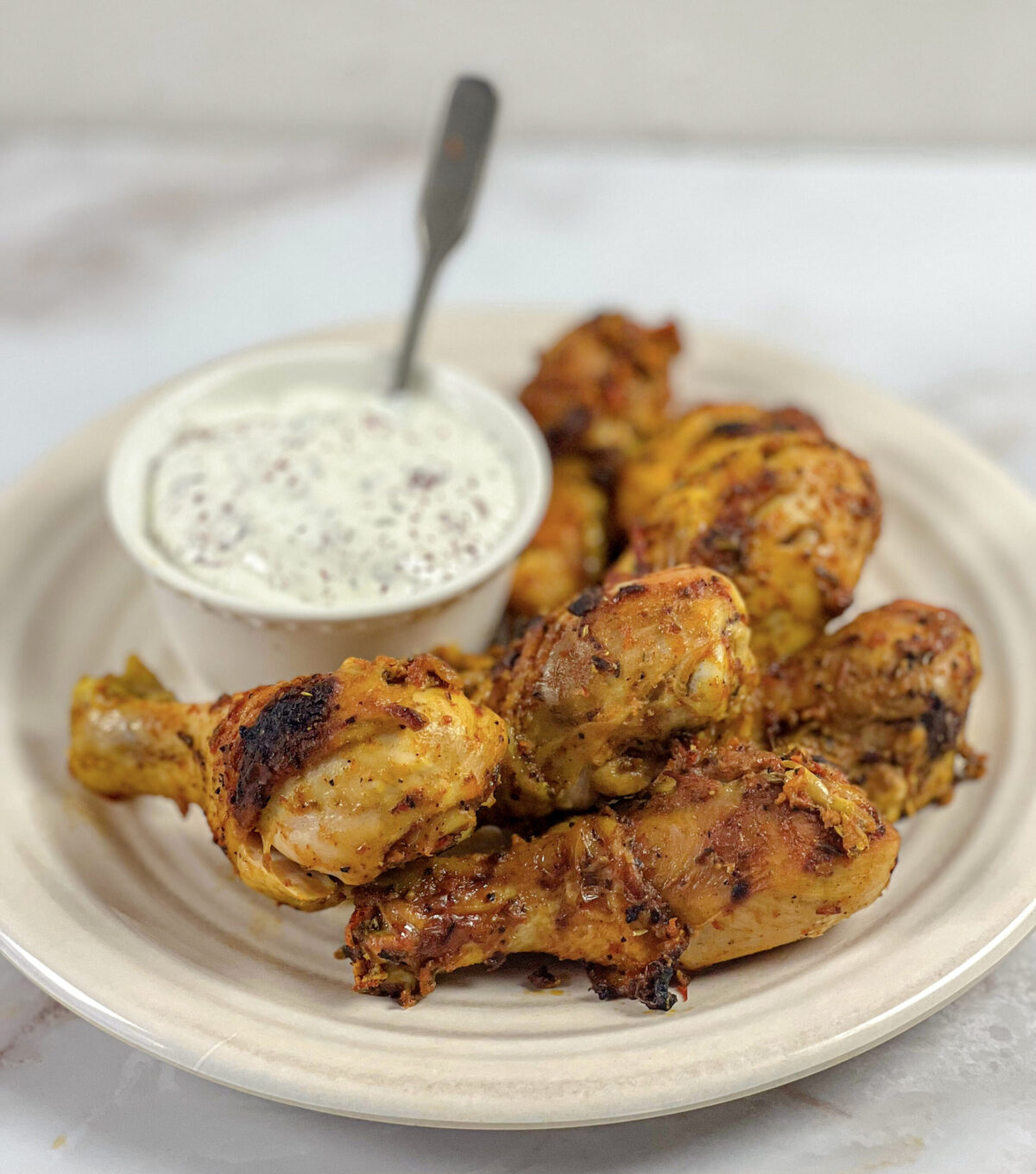

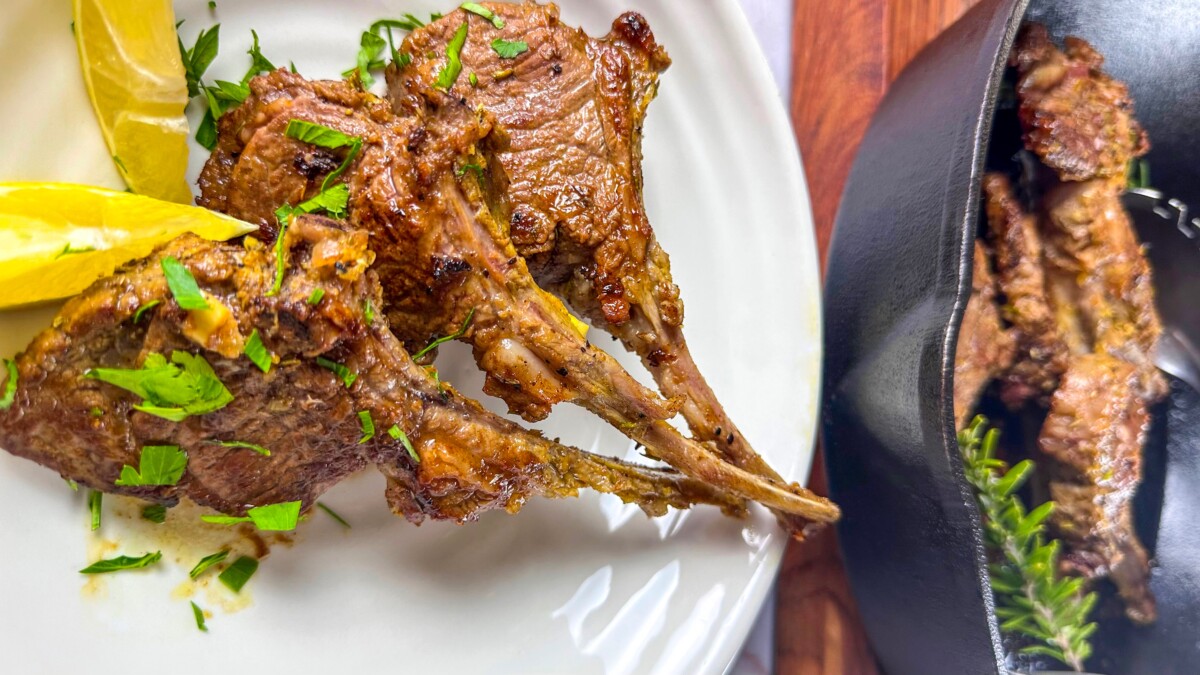

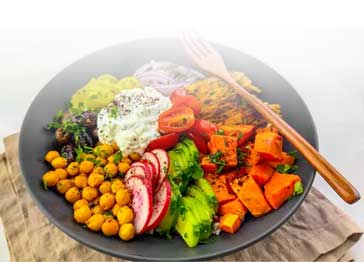
Leave a Reply